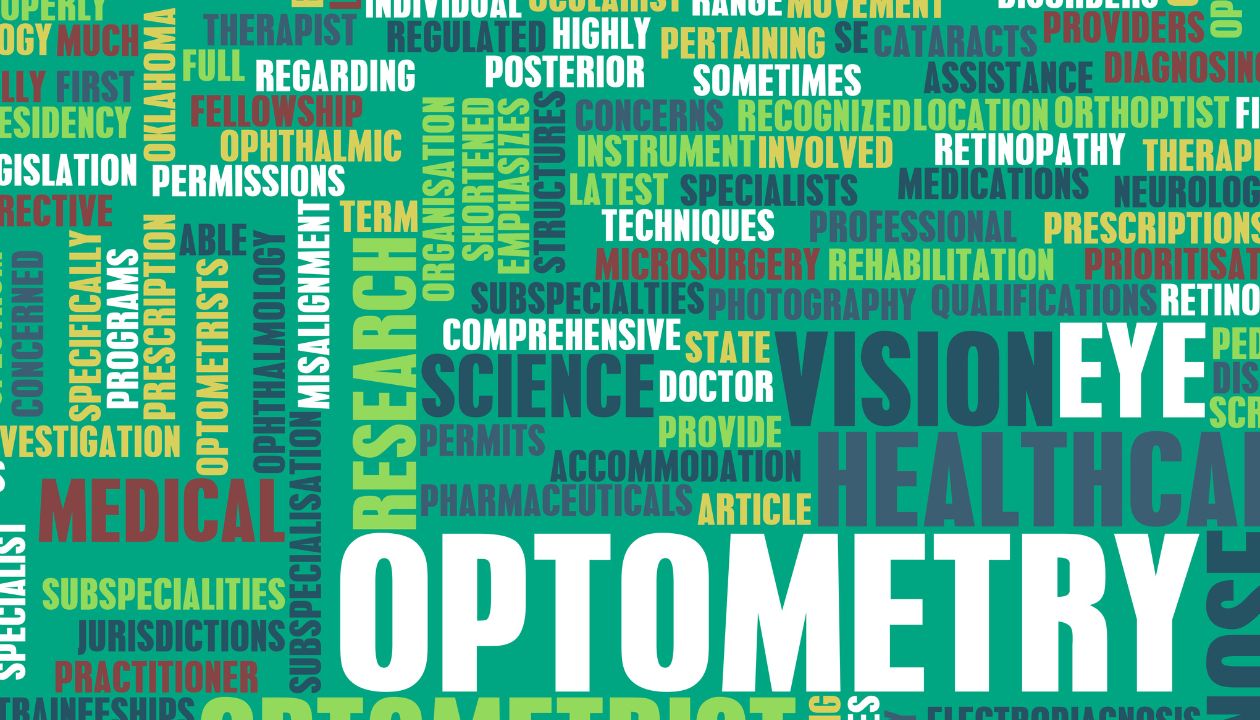In a world where sight is a precious gift, millions still struggle with vision impairment, and in India, this issue is particularly acute. In fact, a staggering one in every three blind individuals globally hails from this vibrant country. But there's hope on the horizon: optometry, a profession dedicated to enhancing and restoring the gift of sight, is on the rise.
For compassionate souls yearning to make a tangible difference in people's lives, optometry is the perfect career choice. With the demand for skilled optometrists in India skyrocketing, now is the ideal time to dive into this fulfilling and rewarding field.
In this article, we'll explore the ins and outs of optometry courses, covering everything from fees, courses, duration, subjects, eligibility, and salary. So, get ready to embark on a journey towards a brighter future – both for you and the millions of individuals whose lives you'll change for the better.

What is an Optometry Course?
Optometry is a healthcare profession that focuses on studying the human eye. The term “optometry” is derived from the Greek words ‘Opsis' and ‘Metron,' meaning something used to measure.
Optometry courses teach students how to diagnose and manage eye-related defects and diseases, including retinal issues, cataracts, and glaucoma.
The recommended title for this group of professionals stands as the ‘Optometrist'. In India, optometrists are trained to be influential eye care professionals, providing primary eye care and working with other eye care providers to combat blindness.
All About Optometry Courses in India
In India, students can pursue the following course:
- Bachelor of Optometry (B. Optom)
- Master of Optometry (M. Optom)
- PhD in Optometry.
Optometry Course Duration:
In India, a Bachelor's degree program in Optometry, which includes one year of clinical training, lasts for four years ((including one year of clinical training /internship). And, Master's degree program in Optometry is of 2 years.
Optometry Course Eligibility:
The minimum educational qualification for B. Optom is 10+2 with Sciences (Biology/Mathematics) or equivalent. Candidates who have completed a diploma in ophthalmic techniques or a diploma in optometry (after completion of 10+2 with science) can also join the undergraduate course.
Such candidates would be eligible to join in the 2nd year of optometry, and the total education required would be two years of diploma studies followed by three years of undergraduate studies. The third year of the program (lateral entry) would be an internship.
Entrance Exams for Optometry Course:
Here is a list of some of the entrance exams that are conducted in India for admission to the B.Optom program:
- AIIMS B.Sc. Nursing/B.Sc. Paramedical Entrance Exam: All India Institute of Medical Sciences conducts this exam for admission to the B.Optom course.
- NEET UG: The National Eligibility cum Entrance Test is conducted for admission to undergraduate medical courses, including B.Optom.
- JIPMER Entrance Exam: Jawaharlal Institute of Postgraduate Medical Education and Research conducts this exam for admission to various medical courses, including B.Optom.
- NIMS University Entrance Exam: NIMS University, Rajasthan, conducts this exam for admission to the B.Optom program.
- LPU National Eligibility and Scholarship Test (LPUNEST): Lovely Professional University conducts LPUNEST for admission to various undergraduate and postgraduate courses, including B.Optom.
- Manipal University Online Entrance Test (MUOET): Manipal Academy of Higher Education conducts this exam for admission to various undergraduate and postgraduate courses, including B.Optom.
- Amity JEE: Amity University conducts Amity JEE for admission to various undergraduate and postgraduate courses, including B.Optom.
- SRM Joint Entrance Examination (SRMJEEE): SRM Institute of Science and Technology conducts this exam for admission to various undergraduate and postgraduate courses, including B.Optom.
- UPSEE: Uttar Pradesh State Entrance Examination is conducted for admission to various undergraduate and postgraduate courses, including B.Optom.
The Entrance exam for the Master of Optometry
Here is a list of some of the entrance exams for the Master of Optometry in India:
- All India Institute of Medical Sciences (AIIMS) – M.Sc. Optometry entrance exam
- L V Prasad Eye Institute (LVPEI) – Bausch & Lomb School of Optometry entrance exam
- Elite School of Optometry (ESO) – entrance exam for M.Optom
- Amity Institute of Behavioural and Allied Sciences – Master of Optometry entrance exam
- Manipal Academy of Higher Education – Master of Optometry entrance exam
- Sankara College of Optometry – entrance exam for Master of Optometry
- SRM University – Master of Optometry entrance exam
- Tamil Nadu Dr MGR Medical University – Master of Optometry entrance exam
- Bharati Vidyapeeth University – Master of Optometry entrance exam
These are some of the popular entrance exams in India for admission to the Bachelor or Masters of Optometry program.
It is important to note that this list is not exhaustive, and other universities or institutes may offer a Master of Optometry with their own entrance exams. It is recommended to check with the respective university or institute for specific details on their entrance exam.
Bachelor of Optometry (B. Optom) syllabus:
Sem 1:
- General Anatomy
- General Physiology
- General Biochemistry
- Geometrical Optics-I
- Nutrition
- English and Communication
Sem 2:
- Ocular Anatomy
- Ocular Physiology
- Ocular Biochemistry
- Physical Optics
- Geometrical Optics-II
- Basics of Computers
- Clinical Optometry-I
Sem 3:
- Ocular Microbiology
- Visual Optics –I
- Optometric Optics-I
- Optometric Instruments
- Ocular Disease –I
- Clinical examination of the visual system
- Indian Medicine and Telemedicine
- Clinical Optometry-II
Sem 4:
- Optometric optics – II
- Dispensing Optics
- Visual Optics- II
- Ocular Disease –II and glaucoma
- Pathology
- Basic and Ocular Pharmacology
- Introduction to Quality & Patient safety
- Medical Psychology
- Clinical optometry-III
Sem 5:
- Contact Lens – I
- Low Vision Care
- Geriatric Optometry & Pediatric Optometry
- Binocular Vision – I
- Systemic Disease
- Research Methodology & Biostatistics
- Clinical Optometry IV
Sem 6:
- Contact Lens –II
- Binocular Vision –II
- Public Health & Community Optometry
- Practice Management
- Occupational Optometry
- Medical Law and Ethics
- Research Project – I
- Clinical Optometry V
Sem 7 & 8:
Internship & Research Project
Master of Optometry (M. Optom) Syllabus:
Sem 1:
- Epidemiology & Community Eyecare
- MOP102 Research Methodology & Biostatistics
- MOP103 Ocular Diseases and Diagnostics I
- MOP104 Research Project
- MOP105 Clinic 1 (General)
Sem 2:
- Ocular Diseases and Diagnostics II
- Advanced Contact Lens I
- Pediatric Optometry and Binocular Vision
- Low Vision and Geriatric Optometry
- Research Project
- Clinics (General)
- Clinics (Specialty)
Sem 3:
- Advanced contact lens II
- MOP302 Low vision care and rehabilitation
- MOP303 Vision Therapy
- MOP304 Research Project
- MOP305 Clinics (general)
- MOP306 Clinics (specialty)
Sem 4:
- Clinics (General)
- Clinics (Specialty)
- Research Project (Dissertation)
Job Opportunities:
There are several areas where optometrists can explore career opportunities, including:
- Corporate sector
- Private practice
- Optical chains or stores
- Public health
- Industries/Companies
- Eye care hospitals & institutions
- Education sector
- Scientific research
- Basic research and integrated professional areas
Optometry Course Fees:
In India, the course fees for BSc Optometry generally range from INR 10,000 to 1 Lakh. On the other hand, for pursuing M.sc Optometry, the average college fees range from Rs. 1 LPA to Rs. 2 LPA. It is important to note that the fees may vary depending on the college or university and other factors such as location, infrastructure, and faculty.
Optometry Course salary:
As an Optometrist in India, the national average salary you can expect to earn is around ₹25,493 per month. This figure can vary depending on a number of factors, such as your level of experience, the city you work in, the type of employer you work for, and the specific industry you work in. However, in general, the field of optometry offers a stable and decent income for professionals in India.
Top Government colleges for Optometry Courses in India:
- All India Institute Of Medical Sciences
- Vinayaka Missions Research Foundation, Salem
- Teerthanker Mahaveer University, Moradabad
- Chhatrapati Shahu Ji Maharaj University, Kanpur
- Akhila Bharatiya Ayurvignan Sansthaan, Rishikesh
- Government Medical College & Hospital, Chandigarh
- Brainware University
- Christian Medical College, Vellore
- University of Hyderabad, Hyderabad
- Atal Bihari Vajpayee Medical University
- Pandit Bhagwat Dayal Sharma Post Graduate Institute of Medical Sciences, Rohtak
- CMJ University
- Jawaharlal Institute of Postgraduate Medical Education and Research, Puducherry
- Uttar Pradesh University of Medical Sciences, Saifai
- King George's Medical University, Lucknow
- Goa Medical College, Bambolim Goa
- Charotar University of Science and Technology (CHARUSAT), Anand
- NIMS University, Jaipur
- Jamia Hamdard University, New Delhi
- Sri Devaraj Urs Academy of Higher Education and Research, Kolar
- IPGME&R and SSKM Hospital
- Singhania University, Jhunjhunu
- KUHS, Thrissur
- University of Calicut, Malappuram
- Yashwantrao Chavan Maharashtra Open University, Nashik
- Capital University, Jharkhand
- Bir Tikendrajit University – State Private University
- Baba Farid University of Health Sciences, Faridkot
- Armed Forces Medical College, Pune
- Dr Y.S.R University of Health Sciences, Vijayawada
- Maharashtra University of Health Sciences, Nashik
- Government Medical College, Kozhikode
- Jaipur National University, Jaipur
- Geetanjali Medical College
- Jayoti Vidyapeeth Women's University, Jaipur
- SNDT Women's University, Mumbai
- Government Medical College, Thiruvananthapuram
- Uttaranchal University
- Rayat-Bahra University, Greater Mohali
- Indira Gandhi Government Medical College & Hospital
- Roorkee Institute of Technology (RIT)
- MES KeVeeYam College
- The Neotia University, Sarisha
- Government Medical College, Patiala
- Shri Ram Murti Smarak Institute of Medical Sciences
- Hind Institute of Medical Sciences
- Sri Guru Ram Das University of Health Sciences, Sri Amritsar
- Rajiv Gandhi University of Health Sciences, Bengaluru
- Government Medical College, Amritsar
- Thanjavur Medical College, Thanjavur
- Pandit Bhagwat Dayal Sharma University of Health Sciences, Rohtak
Some of these colleges provide B.Voc programmes.
Conclusion:
Optometry is a promising career in India due to the high rates of blindness. Bachelor's and Master's programs are available with entrance exams for admission. Optometrists can find job opportunities in various sectors with stable incomes, and government colleges throughout India offer optometry courses.









